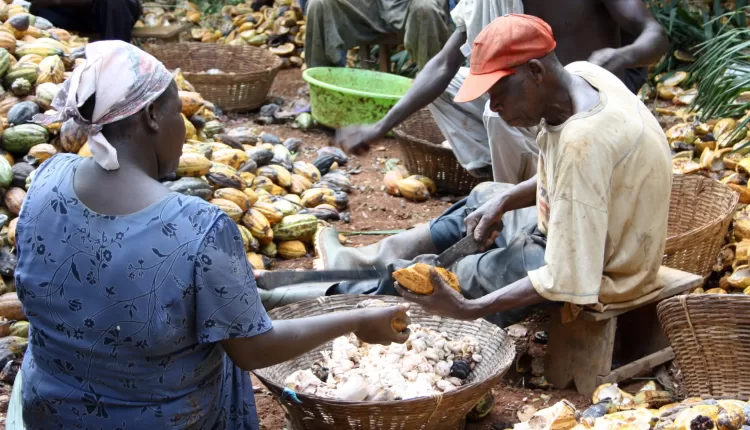An unprecedented scale of cross-border cocoa smuggling activities has rocked Ghana over the last few months.
The alarming loss of the country’s crop output to illegal merchants said to be operating around the borders with Togo, Burkina Faso and Ivory Coast compelled Ghanaian authorities into a forced closure of its 2022/23 crop season.
Industry watchers have linked the unbridled flight of Ghana’s cocoa to several factors, the top among them being farmgate price disparity against Ghana.
While Ghana Cocoa Board (Cocobod) was paying GHS800 per 64kg bag of cocoa, smugglers were said to be offering between GHS1200 to GHS1500 and more.
On September 9, 2023, the government of Ghana opened the 2023/24 crop season with a historic 63.6% increase in its cocoa producer price from GHS800 to GHS1308.99 per bag.
According to the government, the move was expected to halt “recent disruptions in the internal marketing of cocoa” and to “safeguard the interest of cocoa farmers.”
Ivory Coast announced on Saturday, September 30 2023, an 11.1% raise in its cocoa farmgate price from 900 CFA francs per kg to 1,000 CFA francs.
The new price converts to GHS18.74 on CurrencyConvert.net, meaning a bag of 64kg cocoa will sell for GHS1,199.36 which is lower than Ghana’s GHS1,308.99 producer price.
The development has occasioned a level of excitement among some industry actors and a cross-section of the populace.
But while they see it as a cause for celebration, Cocoa Post asks if Ghana can afford to rejoice at Ivory Coast’s lower farmgate price considering the following factors.
Minimum Price Threshold in Ivory Coast
Unlike Ghana’s fixed producer price set by Cocobod and the government, Ivory Coast’s Conseil Cafe Cacao (CCC) sets a minimum threshold farmgate price for buyers and exports.
Exporters cannot buy cocoa from farmers at prices lower than the official farmgate price, but can in the spirit of competition offer more to secure a farmer’s produce.
So it is true that Ivory Coast’s 2023/24 farmgate is comparatively lower than Ghana’s, however, Ivorian farmers may likely receive more at the shed.
Emerging Smuggling Frontiers
As far as cross-border cocoa smuggling is concerned, the narrative from Cocobod and the government suggests clearly that the country’s western border is not its only headache.
Ghana is said to have lost some 150K metric tons of cocoa beans valued at $600 million through smuggling activities in the previous cocoa season.
According to the minister of agriculture, Bryan Acheampong, Ghana’s eastern and northern borders have emerged as significant smuggling frontiers.
Burkina Faso is Ghana’s neighbour to the north. It does not produce cocoa at all. Ghana’s eastern neighbour, the Republic of Togo, is a lightweight in cocoa production.
But these two nations are reported to have become overnight exporters of remarkable quantities of cocoa.
To rejoice over the Ivorian farmgate price will be to discount the bleeding happening in the east and north.
Macroeconomic Factors
The increasing cost of agro-input, spiralling inflation, and exchange rate instability remain the perennial demons eroding the value of Ghana’s cocoa producer price and farmers’ income.
The country’s inflation rate grew from 33.9% in August 2022 to 40.1% in the same month this year.
The Russia-Ukraine situation has led to skyrocketing prices of fertilizer and agrochemicals, while farmers also complain of high labour costs due to scarcity.
Historical data points to Q4 as the season when the Cedi becomes the subject of incessant battering in the hands of the US dollar and other major trading currencies.
Hopefully, the Cedi will continue to hold ground in the last three months of 2023, lest the real value of Ghana’s GHS1308.99 cocoa producer price evaporates.
LBC liquidity and syndicated loan
Once again, the idea for the historic price hike and early opening of the 2023/24 crop season was to enable Cocobod to capture all available cocoa beans in the hands of farmers to end the “disruptions to the internal marketing of cocoa” or simply put smuggling.
But this well-thought-out strategy, at the moment, pales in the light of the continuous delay in the release of seed funds by Cocobod to licensed buying companies (LBCs).
Some LBC operators, who preferred not to be named, conceded they are faced with serious liquidity challenges amid the high cost of bank credit.
It gets even more worrying with the uncertainty surrounding the 31st annual Cocobod syndicated loan, three clear weeks into a crop season open since September 9.
At this point, a call on the authorities at Ghana Cocoa Board to expedite work on making available the financing for the urgent purchasing of the season’s crop is certainly in order.
In conclusion, I congratulate cocoa regulators in both Ghana and Ivory Coast for their concerted efforts and investments in moving the millions of galant cocoa farmers closer to the promise of living income and sustainable cocoa production.
Particularly worth noting is the Cote d’Ivoire – Ghana cocoa cooperation which has proven to be a boon rather than a bane, especially in addressing shared challenges and aligning sector policies in the interest of farmers.
It is in this light, that I strongly encourage Cocobod and the government of Ghana to eschew complacency, and rather wake up to the enormity of the challenges that confront the sector, especially the emerging canker of the theft of Ghana’s cocoa through smuggling, and take urgent measures to nip it in the bud.
There’s no gainsaying what the implications of this challenge portend for the nation’s economic stability.
A stitch in time saves nine!
- Illegal Mining Threatening Ghana’s $230M Cocoa Rehabilitation - April 10, 2024
- Ghana Raises Cocoa Farmgate Price by 58.26% to GHC2,070 per bag - April 5, 2024
- New Standard for Measuring Cocoa Household Income Launched - April 5, 2024
